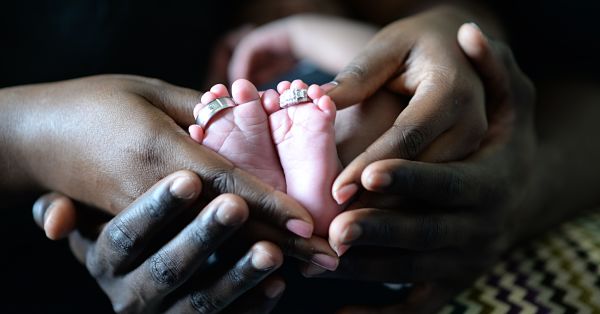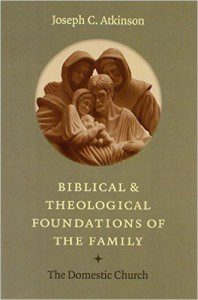We live in a world where the givens of family life no longer can be received as givens. They must be justified to modern people.
Longtime readers of this blog know I am an apologist for traditional ways, especially home ways. I’ve long felt that more is at stake with the loss of traditional ways than is generally believed. Some of my co-belligerents defend them strictly to preserve the goodness of creation–natural law and all that.
But I believe that the new creation is also at stake. There is a deep linkage between the first creation and the second and the linkage is found in family life.
Joseph C. Atkinson sees the same linkage in scripture and points it out in his marvelous study: Biblical and Theological Foundations of the Family.
Now how does this linkage between the first creation and the new creation work?
Here Atkinson is in the introductory paragraph of the chapter entitled, Family as Image of the Covenant:
Although the differences between a sign and a symbol are not always clear, one general distinction is that the symbol inwardly participates in the reality and shows forth what it represents, whereas the sign is of an arbitrary nature vis-a-vis the object represented. (p.128)
Atkinson is a Roman Catholic and we’re getting into territory here that makes Protestants uneasy. Protestants like to stick to explicit statements, implicit meanings seem to open a hole for clerics to smuggle in just about anything they please.
But in this case I think that limiting ourselves to explicit statements can smuggle in something of its own–something easy to overlook because it is itself a breech. By limiting ourselves to explicit commands we can imply that there is a greater discontinuity between creations than scripture warrants. Scripture should be read to say that the new creation fulfills the first, it doesn’t supplant it with something utterly alien.
Look at the language of revelation: Father and Son, new birth, one flesh, bride and groom, and so on. Without the first creation the new creation is incomprehensible. I’m not sure how we can dispense with the structures of the first creation without in the process losing touch with the second.
Back to Atkinson:
Is the relationship between the covenant and marriage merely extrinsic (which would render marriage and family arbitrary signs, used to help explain the covenant because of an accidental, surface resemblance)? Or do marriage and family have an intrinsic relationship to the covenant and somehow interiorly participate in it? Put another way, is this prophetic use of familial language only metaphoric or is something greater going on? (p.132)
Just how much is at stake here? Like I said, more than many evangelicals seem willing to admit.
Perhaps this has something to do with the trend among evangelicals to model churches on shopping malls and business corporations? And when they do attend to family concerns, everything evangelicals do has the flavor of Disneyesque amusement.
There is an unchallenged atomization that has occurred in evangelicalism which accommodates the patterns of modern life. Even the enthusiasm for “community” among young progressive evangelicals smacks of modernism. It is fundamentally disconnected from the structures of creation. Community for hipsters is a bunch of 20 somethings sharing a house and pitching in for food; it isn’t based on the family.
As I noted above, until just yesterday we could take family life largely for granted–we could even denigrate it without much fear, it was so solid we had no need to justify it. But in the age of Heather has Two Mommies, that has changed.
And homosexuality is really just surface of this brave new world. Just the other day I read something about breakthroughs in gene splicing that make it conceptually possible to create a person without parents. Think about it: if we can splice a gene here, and another there, a little bit from a dozen different people or so, we can make the perfect orphan. And if we ever manage to make artificial wombs, we won’t even need surrogate mothers.
What does that do to evangelism, let alone to the poor kid?
And even if we outlaw such practices, how do we retain the power of scripture’s language? If creation is only self-referential, then nothing is at stake when it comes to the new creation. There’s nothing to keep us from throwing out the old metaphors.
I hope that notion makes you queasy.














